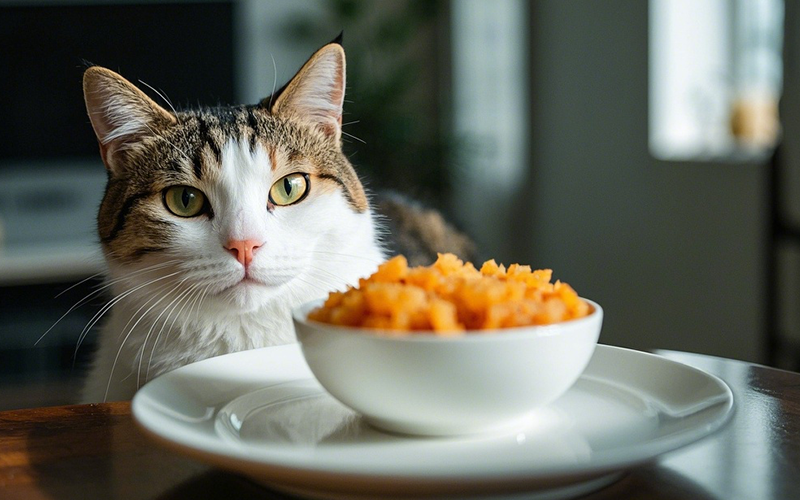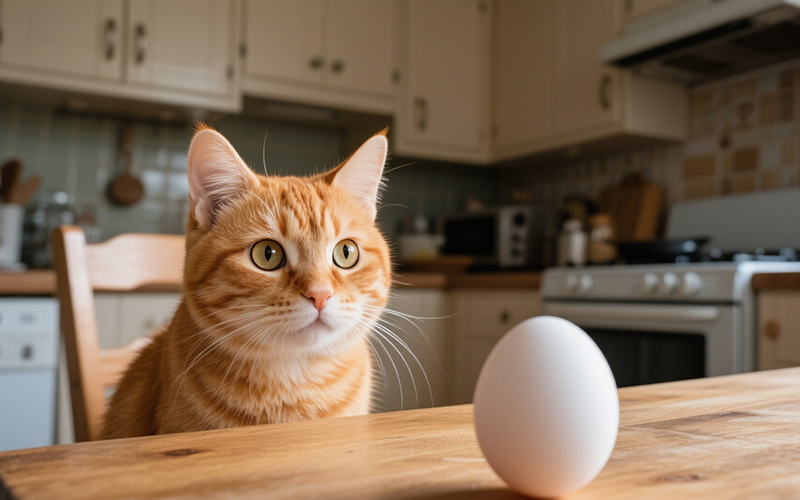Can Cats Eat Salty Food? A Guide to Salt and Your Feline Friend
- 29 Mar 2025 11:12
It’s not uncommon for us to enjoy a little salty snack now and then, but when it comes to your cat’s diet, you may be wondering: “Can cats eat salty food?” The short answer is no, salty food is not safe for cats and should be avoided. While cats require small amounts of sodium to maintain proper bodily function, too much salt can cause serious health problems. Here’s why you should steer clear of giving salty food to your cat.

Why Salty Food is Harmful for Cats
Salt Toxicity: Cats are much more sensitive to salt than humans. Eating salty foods can lead to salt toxicity, which can be very dangerous. Excessive salt intake can result in symptoms like excessive thirst, urination, vomiting, diarrhea, and in extreme cases, seizures or death. This condition is called hypernatremia, and it occurs when there is too much sodium in the bloodstream.
Kidney Stress: Cats’ kidneys are not designed to handle large amounts of salt. Excessive salt intake can put a lot of strain on their kidneys and lead to dehydration. This is especially problematic for cats with preexisting kidney issues, which are common in older cats.
Increased Thirst: Foods high in salt will cause your cat to drink more water than usual. This is the body’s natural response to trying to flush out the excess sodium. However, drinking more water can lead to frequent urination, which can be disruptive and uncomfortable for your cat.
Health Issues Over Time: Regular consumption of salty food can contribute to long-term health issues like hypertension (high blood pressure), kidney disease, and urinary tract problems. Cats with underlying health conditions are particularly at risk, so it's best to avoid salty foods entirely.
Common Salty Foods to Avoid
Chips and Crackers: These snacks are loaded with salt and often contain artificial flavors that are not suitable for your cat.
Processed Meats: Bacon, sausage, deli meats, and similar products are often high in salt and preservatives that can harm your cat.
Cheese and Dairy Products: While cheese can be tempting, it’s also salty and can cause digestive issues, especially since many cats are lactose intolerant.
Canned Soup or Stews: Many canned foods meant for humans, especially soups, are packed with salt. These can be dangerous if consumed by cats.
Fast Food or Takeout: Fast food is often packed with sodium, and offering your cat a bite of your meal could put them at risk for salt toxicity.
Symptoms of Salt Toxicity in Cats
If your cat consumes too much salt, they may show signs of salt toxicity. Symptoms can range from mild to severe and include:
Excessive thirst
Increased urination
Vomiting
Diarrhea
Loss of appetite
Lethargy or weakness
Seizures (in severe cases)
If you suspect your cat has eaten salty food and is showing any of these symptoms, it's important to contact a pet health professional immediately. You can also use PettureX, the pet AI software, for quick advice and online consultations on whether your cat’s health requires urgent attention. 📱
Safer Alternatives for Cats
If you’re looking to treat your cat to something special, there are many healthy and safe alternatives to salty food:
Cooked Meat: Chicken, turkey, or fish are excellent sources of protein that cats can enjoy.
Catnip: A natural treat that’s safe and fun for cats, offering both stimulation and entertainment.
Vegetables: Some cats enjoy small amounts of cooked vegetables like peas or carrots, which can be a good source of fiber.
High-Quality Cat Food: The best way to ensure your cat is getting the right nutrients is to stick to specially formulated cat food designed to meet their dietary needs.
Conclusion
In conclusion, salty food is not safe for cats and should be avoided at all costs. Too much salt can lead to serious health problems like salt toxicity, kidney issues, and dehydration. Always stick to foods that are designed for cats and avoid feeding them salty human snacks. If you're unsure about what to feed your cat or have any concerns about their health, PettureX is a great tool for quick consultations and expert guidance on your cat’s diet. Your cat’s health is important, so make sure to offer them treats that are safe and beneficial! 🐾
Related

Can Cats Eat Egg Yolk Raw? A Vet's In-Depth Guide to Feline Nutrition & Safety
- 10 Jun 2025
Can Cats Eat Dog Kibble? Unpacking the Nutritional Mismatch!
- 29 May 2025
Can Cats Eat Deli Turkey? Slicing Through the Facts for Your Feline!
- 29 May 2025
Can Cats Eat Deer Meat? Exploring Venison for Your Feline!
- 28 May 2025
Can Cats Eat Corned Beef? Unpacking This Salty Human Delicacy!
- 28 May 2025
Can Cats Eat Cooked Rice? The Grain Truth for Your Feline Friend!
- 27 May 2025
Can Cats Eat Cornbread? A Crumb of Truth for Curious Cat Owners!
- 27 May 2025
Can Cats Eat Cooked Meat? Sizzling Facts for Your Feline's Feast!
- 26 May 2025
Can Cats Eat Chili? Spicing Up the Truth About This Human Dish!
- 26 May 2025
Can Cats Eat Chicken Eggs? Cracking the Code on This Feline Food Query!
- 24 May 2025
